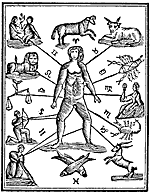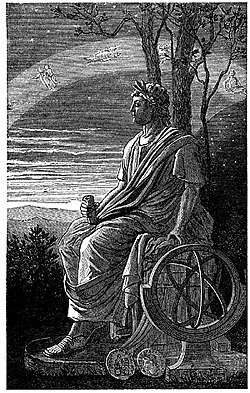Astrology: Facts & History

Science and religion have roundly denounced it for hundred of years, yet it finds its way into newspapers, movie studios—even the White House. What makes Astrology so compelling?
by Damon Goldsmith
 Related Links
|
Have you ever felt you were part of something larger than yourself? That there is a deeper meaning to the world—something beyond the physical senses? A force that flows through the universe, surrounding us and binding us together? If so, you're probably either a Jedi, or you believe in astrology.
Astrology has enjoyed a new popularity in the second half of the 20th century. Millions still practice it worldwide. In the US, newspapers and magazines carry daily and weekly horoscopes. Americans will buy 20 million books on astrology this year, more than four times the number two years ago. Celebrities such as Shirley Temple Black claim to use astrology in their daily lives—even Ronald and Nancy Reagan openly admit to using astrology to help them make decisions while in the White House.
Movements of Astrology
Ancient peoples used astrology to make decisions of every kind: when to hunt, fish, plant, harvest, make war, make peace, and make love. In Roman times the practice of astrology by ordinary citizens was punishable by death; only the Emperor was allowed to consult an astrologist for advice.
The ancient Greeks were instrumental in establishing the foundation for modern astrology. They associated mythical figures from the Greek pantheon to the stars and gave physical and emotional attributes to the planets of the zodiac. Natal, or birth charts became an integral part of astrology during this time as well. Astrology found its way into a number of different disciplines including art, history, religion, and early science.
By the 17th century astrology faced criticism from the church, as well as the blossoming scientific community. The heliocentric theory of planetary motion—developed and refined by such luminaries as Copernicus, Galileo, and Johannes Kepler—proved that the Earth was not the center of the universe.
Their findings unhinged the very framework of astrology, which has since struggled—without much success—to incorporate new astronomical findings into itself. The intervening years have seen astrology's popularity dwindle, as science has served to explain many of the astral phenomena that it once addressed. Only in the last century has astrology regained some of its former prominence.
Born of Two Worlds
Yet astrology's most ancient roots were intertwined with both religion and science. The mathematical computations that were applied to the orbits of stellar bodies to determine charts were the earliest forms of astronomy. Astrology's attempts to explain what the heavens were and relate their movements to humanity's own actions were similar to the questions many religious followers asked of their gods.
The scientific and religious community, often at odds with one another, have found common ground in denouncing astrology. Both have attacked it, claiming that it is neither science nor religion, but an occult and outdated practice.
The Bible specifically warns against astrology in the books of Isaiah, Leviticus, Acts, and Deuteronomy. Though many religious scholars believed in the idea of magic, or celestial influence, they did not believe in the practice of it.
Scientific Observations
To many scientists, the idea that planetary bodies billions of miles away somehow can affect human behavior is absurd. The scientific community contends that there has yet to be any evidence proving a relationship between the position of planets at a given time, and the events, personality, or actions of an individual born at that time. In its own words, astrology does not provide an understanding of stellar phenomena . . . only an interpretation.
Many arguments have been made against astrology. The central and most relevant criticism from the scientific community involves the zodiac, or basic horoscope that astrology uses.
Because the imprecise measurements of early astronomers, the zodiacal calendar that was created 2000 years ago no longer accurately reflects the zodiac we see in the sky. The signs listed in daily newspapers are thus 2-3 weeks away from their original postions in the calendar.

Stargazing Greeks established the Zodiac western astrologers use today.
The Great Unknown
Even astrologers say they do not understand how astrology works—only that it does. They also caution that astrological readings and their interpretations are relative to the person performing the analysis. Two astrologists analyzing the same person independently may come up with vastly different predictions.
Despite the criticism surrounding astrology, it continues to flourish in modern society. Astrology may have no accuracy in providing visions of the future, but it does provide something for many people: understanding. By anchoring the chaotic events of our own lives to orderly astral phenomenon, it provides a stable emotional base. It helps to enforce the idea that our lives are not random, but meaningful and purposeful, like the stars that astrologists so intently watch.
Astrology's age-old idea of human life and understanding relating to the physical universe is a beneficial one. It seeks to provide answers to questions asked 5000 years ago that we are still unable to answer conclusively concerning our purpose and place in the universe. Whether or not you believe in astrology and its future may not be as important as recognizing the important part it has played in our culture and our history.
